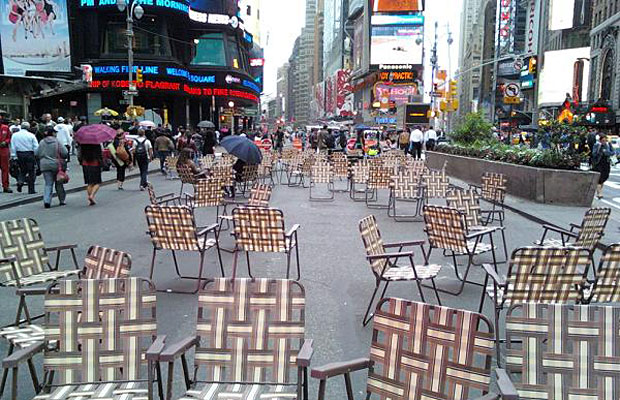
New York? The whole damn place has been turned into a suburb," sneered David Harvey, startling a roomful of New Yorkers who prided themselves on the same things he derided: the makeover of the city's parks; the new network of bike lanes; the pedestrian malls along Broadway. "The feel of the city is losing its urbanity and being made okay for suburbanites to enjoy Times Square," he continued, going on to condemn New York's gentrification not on aesthetic or nostalgic grounds, but for being at the root of the financial crisis.
Harvey is having a bit of a moment in America, as much as any neo-Marxist economic geographer can. Earlier this month, his lucid explanation of the "econopocalyspe" (accompanied by animated whiteboard doodles) was a modest hit on Boing Boing. Richard Florida borrowed his concept of the "spatial fix"--the idea that capitalism gets bigger and badder every time it's wriggles out of a crisis--for his latest book, The Great Reset. And Harvey's own book-length explanation of the crisis, The Enigma of Capital is set to be published on these shores in September.
On Tuesday night in Manhattan, Harvey discussed "experimental geography" and the role cities and suburbia played in the crisis. Starting from the idea of a "geographic unconscious"--"the way we think of space and time as 'natural' when they're really constructed,"--Harvey blamed suburbia for brainwashing Americans into being good capitalists.
But the connections between urbanism and capitalism go deeper than that. In an essaypublished in New Left Review, he drew connections between Haussmann's Paris, postwar America, gentrification and China's instant cities. In each case, the construction efforts employed huge quantities of labor and required new forms of capital and credit, whether FHA mortgages or CDOs. In his estimation, China's breakneck urbanization and the appetite for raw materials this creates is the only thing propping global capitalism up.
At the same time, gentrification has become just another name for suburbia. "Shopping malls, multiplexes and box stores proliferate," he wrote, "as do fast-food and artisanal market-places. We now have, as urban sociologist Sharon Zukin puts it, 'pacification by cappuccino'. Even the incoherent, bland and monotonous suburban tract development that continues to dominate in many areas now gets its antidote in a 'new urbanism' movement that touts the sale of community and boutique lifestyles to fulfill urban dreams."
And New York is the biggest offender of them all. "The billionaire mayor, Michael Bloomberg, is reshaping the city along lines favourable to developers, Wall Street and transnational capitalist-class elements, and promoting the city as an optimal location for high-value businesses and a fantastic destination for tourists. He is, in effect, turning Manhattan into one vast gated community for the rich." Harvey is merely putting into Marxist terms the same laments offered recently by Patti Smith ("New York has closed itself off to the young and the struggling... So my advice is: Find a new city") and the anonymous blogger behind Lost City, who viciously described Bloomberg's city as "homogenous, anodyne, whitewashed, suburban, toothless, chain-store-ridden, ordinary, exclusive and terribly, terribly expensive. A town for tourists and the upper 2%."
Cities like New York "are increasing being constructed around spectacle," Harvey argued Tuesday night. "One aspect of capital is that it wants to move faster and faster; capital cannot abide a long period without change." In cities like Beijing, Shanghai and Mumbai, this change is being brought about by land grabs and slum clearance. In New York and other financial capitals, it's gentrification "making cities a spectacle that is instantly consumed." In other words, we're blinded by the lights to our Matrix-like existence. "We're all suburbanites now, without knowing it," he said. "We're all neoliberals now, without knowing it."
In its place, Harvey has called for a "right to the city" to be recognized as a human right. Considering the urban tsunami that's coming--3 billion additional city-dwellers on top of 3.3 billion now--he has a point. The future of humanity is an urban future, and at this moment America is staring at millions of home foreclosures while China is bulldozing neighborhoods as it sees fit.
Like any committed socialist, Harvey ended his brief talk with a call to arms (a theorist's call to arms, but still): "We've got to revolutionize the geographic subconscious; we've got to revolutionize daily life--that's what really matters. In changing the city, we change ourselves. The real question is: what kind of people do we want to be?"
Source: http://www.fastcompany.com/1673037/david-harveys-urban-manifesto-down-with-suburbia-down-with-bloombergs-new-york
No comments:
Post a Comment